While abuse, neglect and abandonment have always been a problem that the horse community has faced, in recent years we have seen a definite escalation. With the downturn of the economy, an upturn in poor breeding practices, and people who refuse to understand that in today’s market, even a horse with accolades, championships and a stellar pedigree simply are not worth the same amount of money as they once were, the problem has gotten worse. In our community alone, we have seen horses tied to trees on public land or simply “turned out” to wander in neighborhoods so that they become someone else’s problem. This is unacceptable.
There are many wonderful rescue organizations across the country (and the world), but being a lifetime lover of the Arabian Horse, I found myself drawn to a program that one woman, essentially on her own, has created and continues to foster. Rebecca Boardman gives us a glimpse into her world with ART (Arabian Rescue Therapy).
Rebecca, introduce yourself and your organization to our readers.
I am a working class mom of two young children with a non-horsey husband, and I am completely and totally devoted to the Arabian Horse. ART did not start out as a “formal” organization, and to this day, I am the sole full time “employee”. It began with me helping friends who had fallen on hard times with horses in a bad way. I rehabbed them quite successfully and found homes for them. Word spread, and the next thing that I knew, I was being contacted by more and more people; including rescue organizations, sheriff departments, and major breeders. I reached out for volunteers, and with the help of the local college, I have been able to get some wonderful people involved. I am very blessed. To date we have rescued, rehabbed and re-homed over 120 Arabians and Half-Arabians.
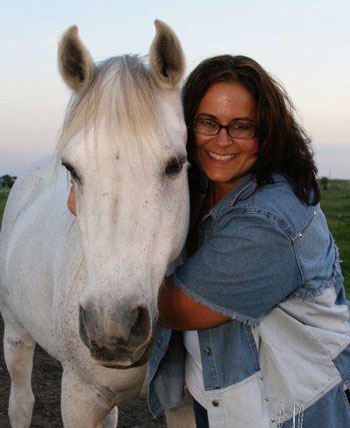
How and when did you first fall in love with horses, and the Arabian breed specifically?
When I was ten years old, my father bought me my first horse; a snow white Half-Arabian that I named “Wish”. She hooked me on the beauty and the versatility of the breed. At thirteen, my life was forever changed when my first purebred Arabian claimed me – his name was “Conman”, and yes, he fit his name, as he conned me out of my heart and I never got it back. For 25 years, we never left each other’s sides. He taught me more than most people will ever forget. He was the epitome of everything the Arabian is supposed to be; fairytale beauty, sheer grit, awesome intelligence, flight without wings, and a touch of naughtiness to add spice to the sugar. Even though he has passed, he is still my best friend.
When did you first become passionate about your cause, and why?
When those first horses I helped stepped off the trailer – starved, bedraggled and bewildered, yet so trusting and so totally dependent on me for help – I knew that I was 100% committed to helping them recover. That is how I have felt about every horse that has come in since.
I knew that I was 100% committed to helping them recover. That is how I have felt about every horse that has come in since.
The breed that you have chosen to focus your efforts on is the Arabian. What can you tell us about the mental recovery of these horses specifically, as we know that physical abuse is only the tip of the iceberg?
They are simply amazing. Of all the horses that have come in and out of my rescue, there have only been two that were mentally unrecoverable. The rest are not only mentally recoverable, but they act exactly like rescued dogs. They know they have been saved and are grateful. To my knowledge, no other breed anywhere is able to form the same unique partnership as the Arabian can with humans. The horses were bred to live in tents with their owners and to depend totally on humans for survival – it shows in their mentality. They love humans and want desperately to please them. They really are “in your pocket”, even after having terrible things happen to them.
Not all of the horses that you help are “backyard” horses, you have rescued and rehomed registered horses with wonderful pedigrees, tell us a little about that if you would.
Oh, good grief, that’s a loaded question! Let’s just put it like this – some of the worst cases I have had were “highly esteemed” pedigreed and/or show horses. When someone believes that a horse is extremely valuable (because of papers, show records, etc.), they are often willing to starve and neglect the horse to the point of death rather than let the horse go to a loving and safe home without getting a bunch of money. Sad, but true…and the horses are the ones that suffer.
One thing that I would like to stress – in almost all the horses I have helped, I have worked tirelessly to secure their registration papers. That was one of the great legacies of the Bedouins – the value of papers, bloodlines and pedigrees for documentation purposes, so I have done my utmost to maintain what I consider a “trust” that has been bestowed upon me in taking on these horses.
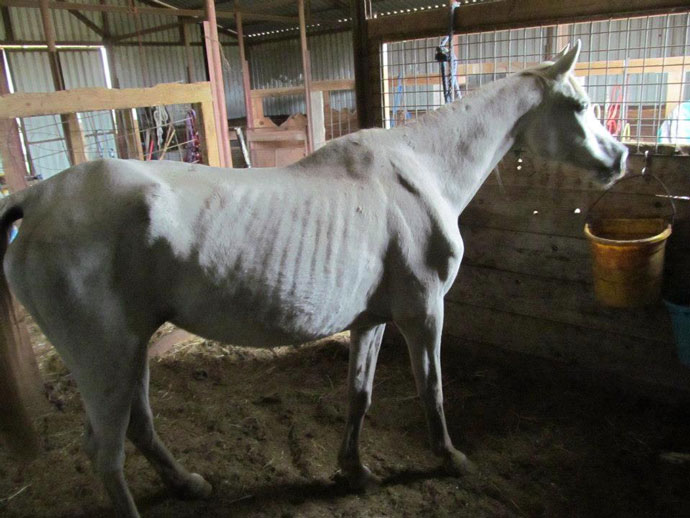
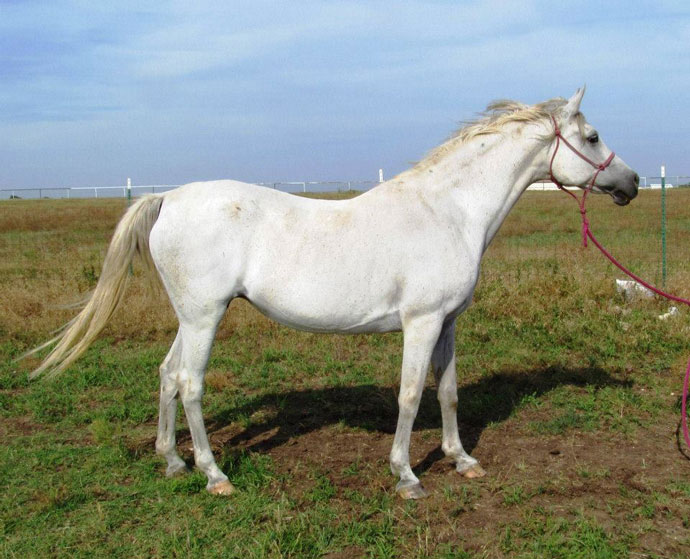
Share with us some of your most memorable success stories. I hear that some of your rescue horses have actually gotten back into the show ring or have become 4-H mounts, therapy horses, etc.
I have so many! While most of the horses have ended up with regular families, just as pets and family riding horses, there are some exceptions. I have had five horses that I can think of offhand that ended up as lesson horses in children’s schools (being used for lessons and showing), two that went on to be 4-H horses (winning ribbons and championships), and one that is one the East Coast as a jumping pony. Several have gone on to good breeding programs and produced show winning foals. I have had two end up as therapy horses, and one that went on to become a breeding stallion.
I will tell you about one in particular (names excluded for obvious reasons). His story is probably the one that I think of most, because he was so unique. We called him Bear. He was one of the two horses I mentioned above that was just not mentally recoverable. He had been so abused, so damaged by his experiences, that his distrust and dislike of people defined him. He had it in his mind that he would never again be fooled. Bear was scary smart. If he had been another breed, he likely would have had to be euthanized, because he despised people, but he would still bow to their will once he was caught, in true Arabian fashion. He never became violent, though his fear and hatred were clear. Catching him was a momentous effort, because he knew every trick in the book. Bear was smarter than any horse I have ever seen since.
What makes his story so unique was not just his mentality, but the fact that we were actually able to find the perfect home for him, just a few miles from our farm! He was used as a breeding stallion by an owner with a lifetime of Arabian breeding experience, who was kind, well respected, and I could check in on him whenever I wanted to.
For almost two years, Bear lived a happy and contented existence, but he never recovered from him lifetime of neglect and suffered from intestinal issues despite the best care. He died of a brain embolism, likely brought on my long-term encysted strongyles emerging near his brain stem. On the upside, he left a son who inherited the very best of his many good qualities, so, you see, his legacy lives on. I’ll never forget Bear.
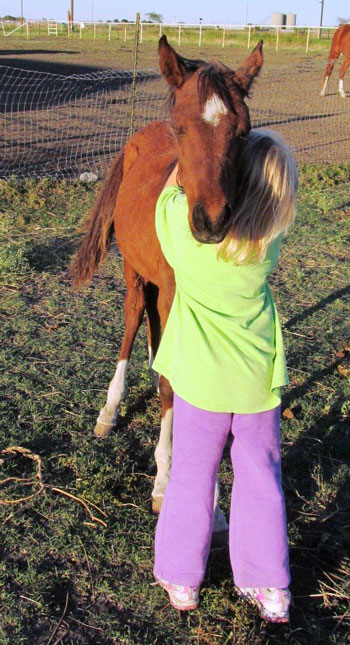
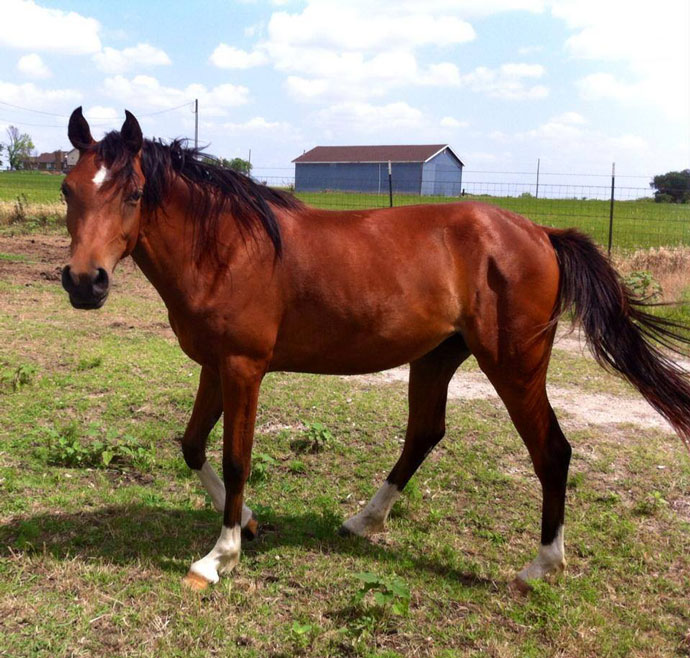
I’m sure that you come across all sorts of nearly unthinkable situations when it comes to getting horses out of bad situations, what are a few of the most difficult situations that you have had to deal with?
Bar none, it was the seizure of a herd of horses that had been seized by the county sheriff. They were at a holding facility for over a month, and they were then auctioned off and I had to be one of the bidders. I will never, ever, do anything like that again.
I also had to pick up a mare once that had never been touched by a human. She still had her foal on her (who had to be left behind), and you can imagine the disastrous scene of separating them and getting her into a trailer without her doing major damage to herself. Disaster unlimited.
How, in your opinion, can the general horsemen and women in the world help to shine a light on this issue of neglect and abandonment, and in keeping with that thought, how can we help to slow down or stop what is happening?
Everyone thinks the answer is to stop breeding, and while I can agree with that in some breeds, the Arabian population has been declining so rapidly that it would be like throwing the baby out with the bathwater. I think the answer is, quit thinking that your horses are worth a ton of money. Don’t wait for your horse to starve (or put yourself in financial distress) because you can’t get the price that you want for it because you believe it supposedly has all of these wonderful qualities that make it “expensive”. Give the horse away to a good, reputable home and cut your losses if you find yourself in a bad situation – think of the animal’s welfare. There are National Champion horses selling for $2000, what makes you think that yours is worth 3 times that much? If you cannot care for your horse, give it to someone who can!
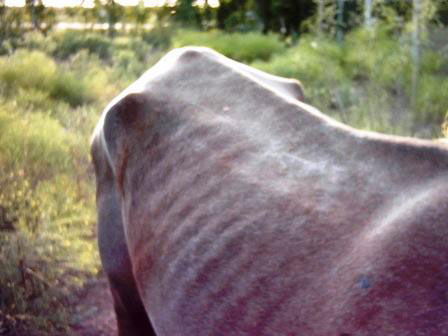
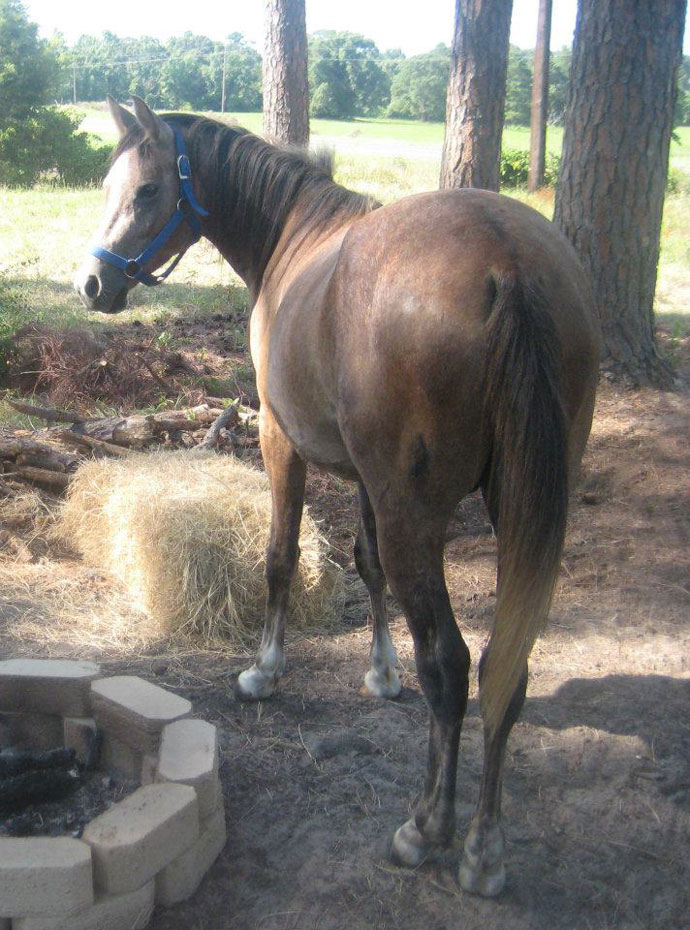
How can we get involved with helping your organization specifically? In addition to much needed donations, what other things can we do to promote, aid and make your job a little easier?
I’m actually not comfortable taking people’s money. I prefer that donations get sent directly to the feed store, or if we have some generous donor out there who wants to make an enormous difference, you can finish paying our land loan, which only has two years left! Our local feed store knows us, and they can supply us with grain, hay, medicines and fencing through direct donation on our website or a PayPal account set up that goes directly to them. I also love volunteers. There is always something to do around here, and there isn’t anything that I do that I’m not comfortable showing to the public.
Winter is coming, and believe it or not, winter in North Texas can be brutal! We need at least 30 large round bales right now. Fencing is also a constant work in progress. We need help grooming, worming, trimming, picking up trash – it’s not all money.
The biggest thing is probably to share my story. Share it with people who might be able to help, but also to anyone who wants to know more about the things that happen out in the horse world.
The biggest thing is probably to share my story. Share it with people who might be able to help, but also to anyone who wants to know more about the things that happen out in the horse world.
So, what is your ultimate goal when it comes to ART?
My ultimate goal is to turn the place into a full time therapy center for abused and handicapped children and adults – think “Wounded Warrior Project”. I’d like to use some of the current on site horses and, of course, others that we rescue that fit the bill to fulfill this dream. These horses form such unique bonds with humans that it makes them the perfect therapists. Using rescued horses to rescue people – what could be better than that?
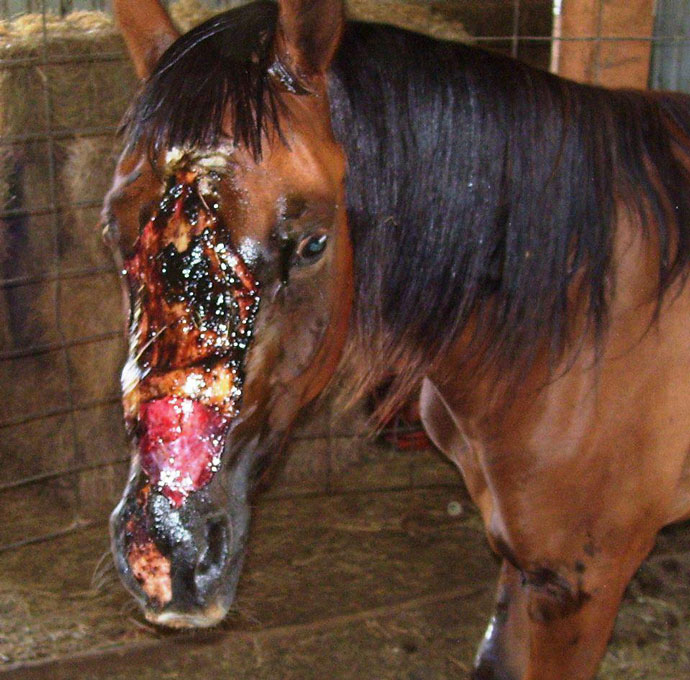
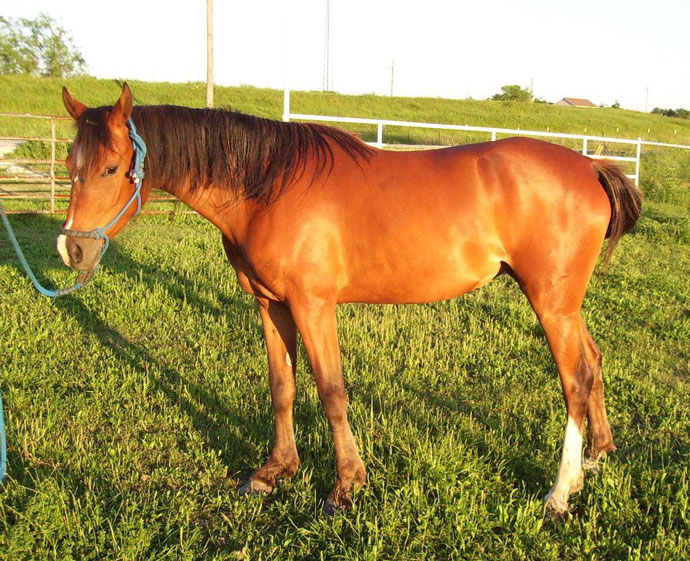
Finally, give us some closing remarks on the topic of horse abuse, neglect and your philosophy on doing what you can even in the face of personal sacrifice.
I’m only one person. I’m not rich; I’d actually be a lot better off financially without this passion. I’m actually able to qualify as “disabled” due to 18 knee surgeries, but I won’t do it. I work like everyone else does. There is nothing special about me, yet I have somehow managed to make a difference. If I can do these things – without advertising, without government assistance, without “campaigns” or politics, or even lots of money – then many other people can do it too. I’m not saying to go out and save 100 horses…start with one. Make a difference for one starving, beaten, neglected horse. Sadly, there are thousands of them out there that need help. Go to your local auction and find a horse with a kind eye and a gentle soul; take home a bag of bones and slowly restore that one animal to physical health and teach it how to love and trust again. Then turn it over to a well chosen new family who you are willing to stay in touch with for the rest of the animal’s life. Watch them bond and feel your own heart grow ten sizes. Then maybe, just maybe, you’ll do it again. We can all make the world a better place, one horse and one person at a time.
I’m not saying to go out and save 100 horses…start with one. Make a difference for one starving, beaten, neglected horse… We can all make the world a better place, one horse and one person at a time.
A big “thank you” to Rebecca Boardman for all of her good work with ART and what she has done for the Arabian Horse. As she so eloquently stated, while donations are desperately needed (and I urge anyone who has a spare dollar or two in their wallets to think about helping with feed, fencing, medications, wormers, or even horse sponsorships for this great woman and her cause), it’s not all about money. Start getting realistic about what horse’s are “worth”…instead of thinking about “worth”, think about how “worthy” they are of a good, safe and comfortable life. We can all make a difference in so many different ways.
Find Arabian Rescue Therapy on Facebook at facebook.com/ArabianRescueTherapy or on their website: arabianhorsetherapy.yolasite.com.
Feed donations can be made directly to Rebecca’s local feed store through PayPal to: arthorsefeed@gmail.com.
Rebecca is also an extremely talented Equine artist, and she uses all of the proceeds from her art to put back into her rescue organization. Be sure to stop by her artist page – maybe you’ll see something you like and save a life at the same time! Find out more at www.rbartgallery.com and www.facebook.com/RBArtGallery
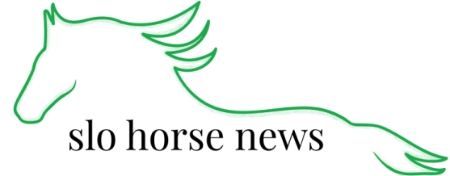
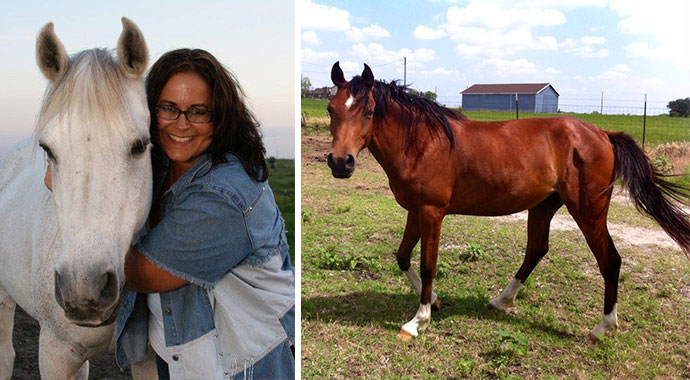
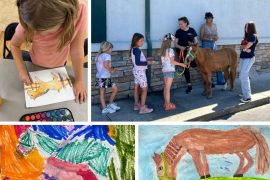
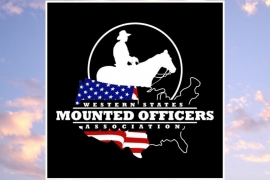
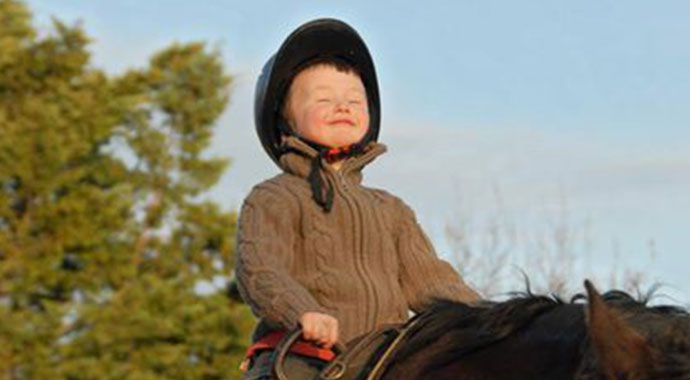
I am so honored and humbled – THANK YOU!
Really a blessing to help shine a light on such good work!